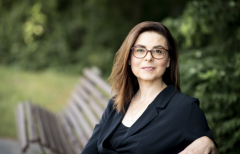Former Professorship Holder: Dr. Birgit Hopfener (2021-2023)
 Dr. Birgit Hopfener is an art historian of contemporary art and theory in the global context. She is an Associate Professor in the School for the Study of Art and Culture at Carleton University, cross-appointed with the Institute for Comparative Studies in Literature, Art and Culture. Her research and teaching are situated in the field of critical global art history with a regional expertise in Chinese art.
Dr. Birgit Hopfener is an art historian of contemporary art and theory in the global context. She is an Associate Professor in the School for the Study of Art and Culture at Carleton University, cross-appointed with the Institute for Comparative Studies in Literature, Art and Culture. Her research and teaching are situated in the field of critical global art history with a regional expertise in Chinese art.
As a scholar and human being, my criticality has been shaped at the disciplinary interstices of art history, cultural theory, image studies (Bildwissenschaft) and Sinology, through engagements with different languages (German, English and Chinese) and different academic systems in Canada, China, Germany and Switzerland. In the wake of the current methodological crisis in the humanities, the increased awareness that universalized modern Western conceptual frameworks and unilinear narratives are too limited to grasp the complex knowledge and power structures of today’s (art) world, and fail to repair colonial and imperialist violence, my research relates and builds upon the discursive frameworks of “critical contemporaneity” and “situated knowledge” as a way to imagine how to relate to the world and each other (through art) otherwise, as co-evals and equals, beyond modern Western binaries and hierarchies.
2021-2023 Theme: The Temporal Diversity of Our Time. Pluralizing Time and Unlearning the Modern Western Temporal Regime
For her tenure as the holder of the Ruth and Mark Phillips Professorship in Cultural Mediations, Dr. Hopfener invites ICSLAC students, faculty as well as other colleagues and friends to explore how scholarly writing, art and cultural artifacts engage with the temporal heterogeneity of our time, its socio-political, geo-political and historical conditions and in the multiplicity of temporal assumptions that shape us, art and knowledges.
The seminar and program of research engagement that I conceptualized relates to these research interests. To conceive of contemporary art as a critical and not a temporal/chronological category, I argue, is the necessary precondition to provincialize the Euro-American modern-postmodern narrative as the dominant framework of contemporary art. “Critical contemporaneity” means to conceive of contemporaneity as a “disjunctive unity of present times” (P. Osborne) and of contemporary art as constituted of and critically engaging with the temporal and spatial heterogeneity of today. In my work, I take the questions “what shapes contemporary art in the global context?” and “what other genealogies of art constitute contemporary art?” as the starting point to examine what multiple and transculturally entangled historiographies and epistemologies constitute art, and are operative through art’s various agents, institutions and concepts. I am particularly interested in how certain temporal assumptions (temporal regimes and historiographical models) generate and govern worlds, shape art, knowledges, subjects and disciplines respectively.